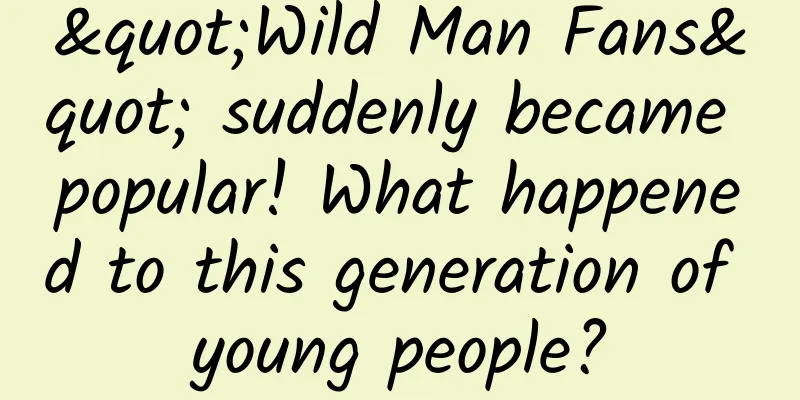"Wild Man Fans" suddenly became popular! What happened to this generation of young people?

|
It’s too late to mourn the City Walk that went viral last year. What’s coming up now is the Wild Eat that young people love, and even the free-spirited Street Brunch was added not long ago! What are these ways of playing? Why do young people always like to do these things? What are the commonalities behind these behaviors? Let's talk about them today. What do these gameplays mean? City walk, which means "city roaming", commonly known as "strolling", refers to the fact that some young people have given up on buying tickets and going to popular scenic spots to see the crowds, and instead choose to check in at places that can be seen everywhere, such as street corners, parks, and unpopular shops. How popular was City Walk last year? The number of readings of the topic on Weibo alone reached at least 36.912 million. Not long after the popularity of City Walk faded, the craze for Wild Eats emerged among young people. Wild eat means "eating in the wild", which refers to eating outdoors . This term originally appeared in the outdoor circle, but now it has become popular on major online platforms. Different from the carefully prepared camping (Picnic), Wild Eat focuses on the word "wild" . People who eat wildly enjoy the breeze in the valley and bask in the beautiful sunshine, but they take out a pot of garlic shrimps from the thermos, or take out a roast chicken, a homemade sandwich, or even a bag of spicy strips from their schoolbags. Young people use these simple foods to create a unique sense of relaxation. Later, some people came up with a new idea: eating brunch while walking in the city, which was called "street brunch"... Street brunch. Image source: Xiaohongshu Young people who are keen on these games think that this is a way for them to "revive" and regain the fun of life in their spare time. But some people think that this is just "taking a walk" or "having a picnic"? It's really boring to follow this trend that has nothing new to it. Today, let’s look at what these new ways of playing can actually give young people from a psychological perspective. Whether walking or eating Just a breather A United Nations research report shows that by 2050, more than 70% of the world's population is expected to live in urban areas. For example, in the United States and Canada, 80% of the population already lives in cities. Although cities provide people with more job opportunities, better medical and health services, and richer living and entertainment facilities, this inevitably brings more life pressure. Studies have shown that the prevalence of mental illness in urban areas is 38% higher than that in rural areas. Living in a busy city for a long time, not only is it difficult to get enough sleep and have a regular schedule on weekdays, but even on weekends, people often feel tired for no reason, and sometimes even feel negative emotions such as pessimism, depression, and anxiety. They just want to lie down at home and watch videos. Work and life seem to have lost the fun they should have. Psychologists believe that this is because long-term city life will aggravate the depletion of the brain's cognitive resources , the most typical of which is the depletion of attention resources, which manifests itself in a decline in cognitive ability, such as decreased efficiency in problem solving and conflict resolution, easy distraction, memory loss, and impaired emotional control ability, ultimately leading to a series of mental health problems. Therefore, in the busy city life, it is extremely important to adopt some methods to restore cognitive resources such as attention, so that we can have "spare energy" to focus on the joy of life itself and maintain a positive emotional state. Whether it is going for a city walk or going for a wild eat, these are ways to relax your mind. Our mental health is actually like a spring. If we are stressed and depressed for a long time, we will lose some elasticity and it will be difficult to return to our original healthy state. However, if we can relax ourselves more, we can make our mind more elastic and our ability to cope with external pressure will become stronger. It's okay to go wild, there are really many benefits A recent study published in Frontiers in Psychology explored how walking in urban and natural environments affects people's emotions and cognitive performance. The researchers recruited 100 volunteers and randomly assigned them to an urban group and a natural group. The volunteers in the urban group walked on busy streets with shops, restaurants, and parking lots on both sides of the streets, while the volunteers in the natural group walked in the woods with various plants, rivers, and small bridges, as shown in the figure below. Image source: Reference 2 Both groups of volunteers were required to walk for 30 minutes and complete an emotional state assessment and cognitive ability test before and after the walk. The emotional state was assessed using the Positive and Negative Affect Schedule (PANAS), which required volunteers to rate 20 different emotional states on a 5-point scale, including both positive and negative dimensions, such as concentration and fear. The cognitive ability test used the Operation span task (OSPAN). Volunteers needed to complete a set of simple math problems (such as 9×3-2=25) while remembering and recalling a string of randomly generated letters. The OSPAN score can well reflect the subjects' ability to allocate and deploy cognitive resources. The results of the study found that after walking for 30 minutes in both natural and urban environments, the volunteers' positive emotions were significantly improved and their negative emotions were significantly reduced, but their OSPAN scores did not improve significantly. But another study increased the walking time to 50 minutes and found that while OSPAN scores did not improve much in urban environments, they improved by about 27% in natural environments. This shows that taking a walk or eating something in the wild does have a certain effect on restoring emotions and cognitive abilities , but it is also very important to try to expose yourself to the natural environment in the wild for at least half an hour. This can not only make your mood more pleasant, but also recharge your brain, which can restore your cognitive abilities to a certain extent. Whether it is the crazy literature from a long time ago, or the City walk and Wild eat in the past two years, or the more recent street brunch, it can be seen from these recently popular activities among young people that young people today are paying more and more attention to their mental health. Compared to the previous generation who were more willing to suppress their mental stress in their hearts and bear the pressure of life silently, the spiritual core of this generation of young people is beginning to tend to be more eager to find a cost-effective way to vent their emotions, which can allow them to open up a piece of spiritual pure land for themselves and retain some happiness that belongs to their generation after busy and stressful office work. So, maybe these activities may seem to be "rehashing old stuff" in the eyes of some people, but at least from the perspective of mental health, there is no doubt that the mental state of this generation of young people is better than ever before. Just like the popular saying on the Internet, "rough life, refined circle of friends", aren't all these fancy things actually just young people giving their own psychology a "refined decoration"? References [1] United Nations, Department of Economic and Social Affairs, Population Division (2019). World Urbanization Prospects: The 2018 Revision (Report No. ST/ESA/SER.A/420). New York: United Nations. [2] LAMBERT, Kelly G., et al. Brains in the city: Neurobiological effects of urbanization. Neuroscience & Biobehavioral Reviews, 2015, 58: 107-122. [3] Scott, EE, Crabtree, KW, McDonnell, AS, LoTemplio, SB, McNay, GD, & Strayer, DL (2023). Measuring affect and complex working memory in natural and urban environments. Frontiers in Psychology, 14, 1039334. [4] BRATMAN, Gregory N., et al. The benefits of nature experience: Improved affect and cognition. Landscape and Urban Planning, 2015, 138: 41-50. Planning and production Author: Chen Yufeng, Master of Developmental and Educational Psychology Reviewer: Yang Xiaoyang, Associate Professor, School of Psychology, Sichuan Normal University Planning丨Ding Zong Editor: Ding Zong Proofread by Xu Lai and Lin Lin |
<<: Wetland Guardian, explore the magnificent transformation of the White Bone Peak!
>>: I can’t bear to throw away expired food, but can I still eat it?
Recommend
The fission gameplay of Weibo traffic diversion!
I have been in the Internet circle for 6 years an...
Children play with mobile phones for a long time? Research warns: brain is immature and self-regulation ability is poor
The 7-day Spring Festival holiday has ended. I be...
Nature News: AI reproduces Nobel Prize-winning research in just a few minutes, and succeeds once
In just a few minutes, AI successfully replicated...
KDJ comprehensive interpretation 7 video lessons
KDJ comprehensive interpretation of 7 video lesso...
Chairman of BAIC: There is no point in having an electric car with a long range, 300 kilometers is enough
The vigorous development of new energy vehicles i...
User growth fission guide!
Fission is a standard feature for user growth and...
Audi is fighting Tesla to the death, and the electric car industry is entering the eve of dawn
With its eye-catching appearance, outstanding per...
In Zhaosu, Xinjiang, be a "rainbow chaser"
The rainbow has been a symbol of beauty since anc...
Mercedes-Benz: Mercedes-Benz global sales in Q4 2023 were 514,000 units, with annual cumulative sales reaching 2,043,800 units
According to media reports, Mercedes-Benz recentl...
Analysis of Zhihu’s operation and promotion strategies!
Introduction: What content operation strategies d...
Chen Xudong: I have repeatedly asked myself what it takes to be successful at Magic Factory
Earlier this month, Zhou Hongyi gave Lenovo's...
Peanut Shell Dynamic Domain Name Software 3 Major Version: Client Supports WeChat Remote Management
On May 30, 2016, the new version of Peanut Shell ...
WeChat vs. TikTok: Analysis report on 4 major categories!
In 2019, WeChat’s monthly active users reached 1....
Drinking is harmful to your health. Here are 3 signs that you need to put down your glass and stop "self-harming"
Since the advent of alcohol, human beings have al...
Baidu Promotion: Tips for Ad Landing Pages with High Conversion Rates!
Party A: Why does my website have such a poor con...









